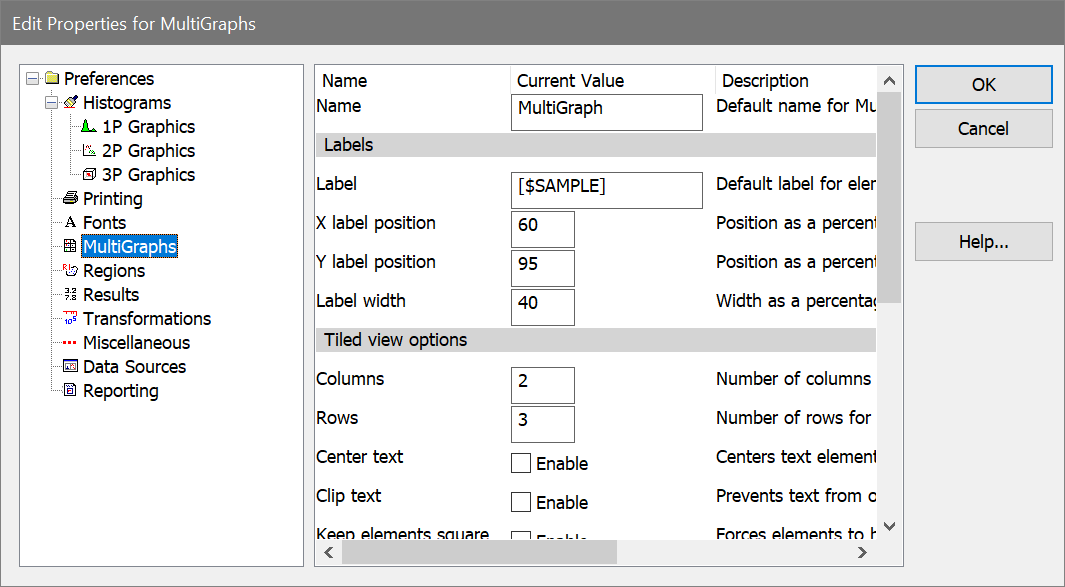
To display the dialog, choose Preferences from the File (Application) menu or the Options tab of the ribbon bar. In the menu & toolbar interface, the command is in the Options menu.
These preferences are used by MultiGraph windows.

Name
Enter the default name for the MultiGraph window. You can enter text, or type a keyword enclosed in square brackets. For example, [FILE] will cause a new MultiGraph to be named with the listmode file name of the active data source.
Labels
Label
Enter the default label to use for graphical elements in a MultiGraph.
Labels can include any FCS keywords embedded in the data file and internal WinList keywords. Keywords must be surrounded by square brackets [ ]. See Internal Keywords for more on keywords.
Label position and width
The X and Y positions and the width can be entered in these edit boxes. The numbers are in percentage of the windows where 0 percent x and y is the lower left corner of the window, and 100 percent x and y is the upper right. X and Y positions determine the origin of the label. The width, again in percent, determines how wide the label can extend. Usually, the width and the x position values should not add up to more than 100 or the label will spill out of that histogram's portion of the MultiGraph.
Tiled view options
Columns
Enter the default number of columns for tiled MultiGraphs.
Rows
Enter the default number of rows for tiled MultiGraphs. If you want an unlimited number of rows on one MultiGraph page, enter 0 for rows.
Center text
Check this item to center results text in the element space. If unchecked, results text is left aligned.
Clip text
Check this item to keep results text from entering adjacent element space.
Keep elements square
When checked, the histogram elements in the MultiGraph will always be square, preventing distortion of the histogram graphics. The overall size of the elements may shrink with this checked, since the program will use the lesser of the X and Y element size to determine the space in which to draw.
Element spacing
Choose the amount of space, in pixels, to leave between elements in a MultiGraph.
Other options
Picture creation size
The value specifies the virtual size for a histogram window when creating a picture (metafile) of the histogram to add to the MultiGraph. Enter a larger value to reduce the size of fonts in the picture relative to other aspects of the histogram, or a smaller size to increase the fonts. Default value, 7.6 cm. or 3.0 in., works well in most cases.
Dot size
This option allows you to select a dot size to use when adding dot plots to the MultiGraph. The dot size can be the same as the histogram dot size, or you can choose a different setting. This may be useful if your MultiGraphs are not printing dots correctly to high-resolution printers, in which case you would choose a larger dot size for the MultiGraph than what you have for the histograms normally.
Histogram quality
This option controls the quality of the histogram graphics that are generated when histograms are added to a MultiGraph. Lower quality settings will produce graphics that require less memory, draw faster, and print faster. Perfect quality requires the most memory and draws the slowest, but produces the best output possible from the program. Experiment with this setting to find a suitable quality for your purposes.
Copy background color
When enabled, the background color for histograms is copied with the histogram graphic. When this option is not enabled, the background color of the MultiGraph appears behind transparent histogram graphics.
Text lines per element
When copying an entire MultiGraph to the clipboard, this setting determines how to scale the font used for results window elements. Enter a value that is at least as big as the maximum number of rows for the results elements contained in the MultiGraph.
Grid offset
This option allows you to align grids for left-to-right and right-to-left view MultiGraphs. The value is the fraction of the MultiGraph window to offset the grids so that they align with the axes of the elements. Default value is 0.15.
Save preferences
When checked, these preferences will be stored as new default preferences when you click OK to close the dialog. If unchecked, changes are only applied to this session of the program.